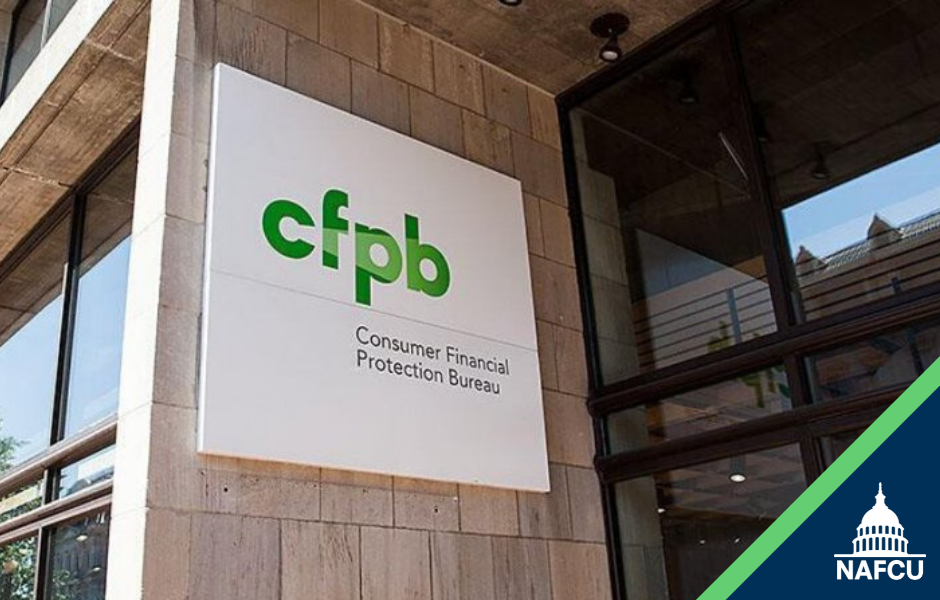Newsroom
NAFCU recommends ways to strengthen credit card market
 NAFCU Regulatory Affairs Counsel James Akin sent a letter to the CFPB Monday outlining ways to strengthen the consumer credit card market, including more regulatory clarity related to disclosures and fewer rules that jeopardize credit unions’ ability to offer affordable credit card products to underserved communities and special populations.
NAFCU Regulatory Affairs Counsel James Akin sent a letter to the CFPB Monday outlining ways to strengthen the consumer credit card market, including more regulatory clarity related to disclosures and fewer rules that jeopardize credit unions’ ability to offer affordable credit card products to underserved communities and special populations.
Akin noted that the cost of disclosures is one of several obstacles credit unions face when entering or competing in the credit card market. He detailed several updates to improve Regulation Z disclosure requirements, including:
- increased flexibility to obtain consumer consent for electronic disclosures;
- clarification that the written application requirement for young consumers in the regulation can be satisfied by providing information orally during a telephone call; and
- amending the timing requirements for disclosures to allow written disclosures to be delivered or mailed “as soon as reasonably practical” after a telephone call.
In addition, Akin highlighted credit unions’ “proven track record of offering affordable credit card products to underserved communities and special populations.”
“The Bureau has recognized, time and again, that credit unions hold a unique, and invaluable, place within the consumer financial services market for underserved or rural communities, and low-income consumers,” he wrote. “To ensure the financial stability of these groups and facilitate much-needed access to credit the CFPB should focus on granting flexibility in credit card disclosures and fostering an environment that encourages innovation.
“Furthermore, the Bureau must avoid implementing initiatives such as the reduction in safe harbor fee amounts for credit card late fees, as this could negatively affect communities by tightening credit and increasing industry consolidation while resulting in more expensive products and services to account for the lost revenue,” Akin said, and provided additional insights into how the late fees proposal will negatively impact credit unions and the consumers they serve.
The letter was sent in response to the bureau’s request for information (RFI) to inform its biennial report on the state of the consumer credit card market. NAFCU also joined with several trades in a letter bolstering the association’s arguments. The joint trades letter highlighted data showing trends in credit card availability – which could be restricted by the late fees proposal and potential legislation to further cap interchange revenue – interest rates, rewards programs, competition, disclosures and electronic signatures, credit reporting, and more.
NAFCU will continue to fight back against the bureau’s misguided efforts that will restrict access to safe, affordable credit.
Share This
Related Resources
Add to Calendar 2024-06-26 14:00:00 2024-06-26 14:00:00 Gallagher Executive Compensation and Benefits Survey About the Webinar The webinar will share trends in executive pay increases, annual bonuses, and nonqualified benefit plans. Learn how to use the data charts as well as make this data actionable in order to improve your retention strategy. You’ll hear directly from the survey project manager on how to maximize the data points to gain a competitive edge in the market. Key findings on: Total compensation by asset size Nonqualified benefit plans Bonus targets and metrics Prerequisites Demographics Board expenses Watch On-Demand Web NAFCU digital@nafcu.org America/New_York public
Gallagher Executive Compensation and Benefits Survey
preferred partner
Gallagher
Webinar
Add to Calendar 2024-06-21 09:00:00 2024-06-21 09:00:00 The Evolving Role of the CISO in Credit Unions Listen On: Key Takeaways: [01:30] Being able to properly implement risk management decisions, especially in the cyber age we live in, is incredibly important so CISOs have a lot of challenges here. [02:27] Having a leader who can really communicate cyber risks and understand how ready that institution is to deal with cyber events is incredibly important. [05:36] We need to be talking about risk openly. We need to be documenting and really understanding what remediating risk looks like and how you do that strategically. [16:38] Governance, risk, compliance, and adherence to regulatory controls are all being looked at much more closely. You are also seeing other technology that is coming into the fold directly responsible for helping CISOs navigate those waters. [18:28] The reaction from the governing bodies is directly related to the needs of the position. They’re trying to help make sure that we are positioned in a way that gets us the most possibility of success, maturing our postures and protecting the institutions. Web NAFCU digital@nafcu.org America/New_York public
The Evolving Role of the CISO in Credit Unions
preferred partner
DefenseStorm
Podcast
AI in Action: Redefining Disaster Preparedness and Financial Security
Strategy
preferred partner
Allied Solutions
Blog Post
Get daily updates.
Subscribe to NAFCU today.
